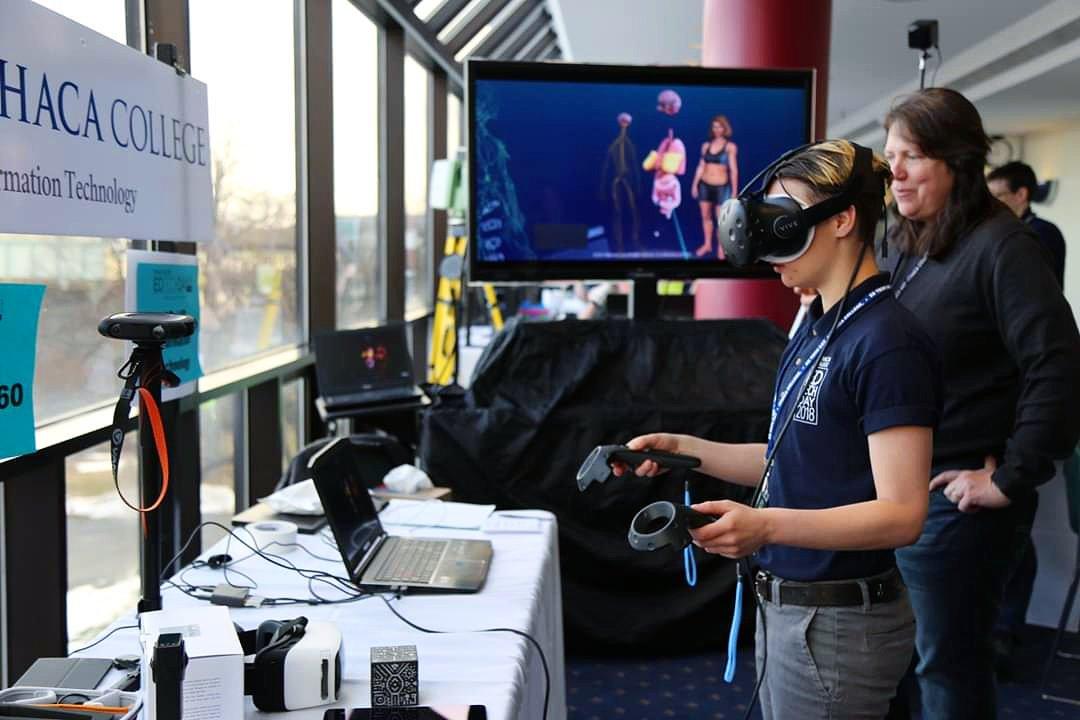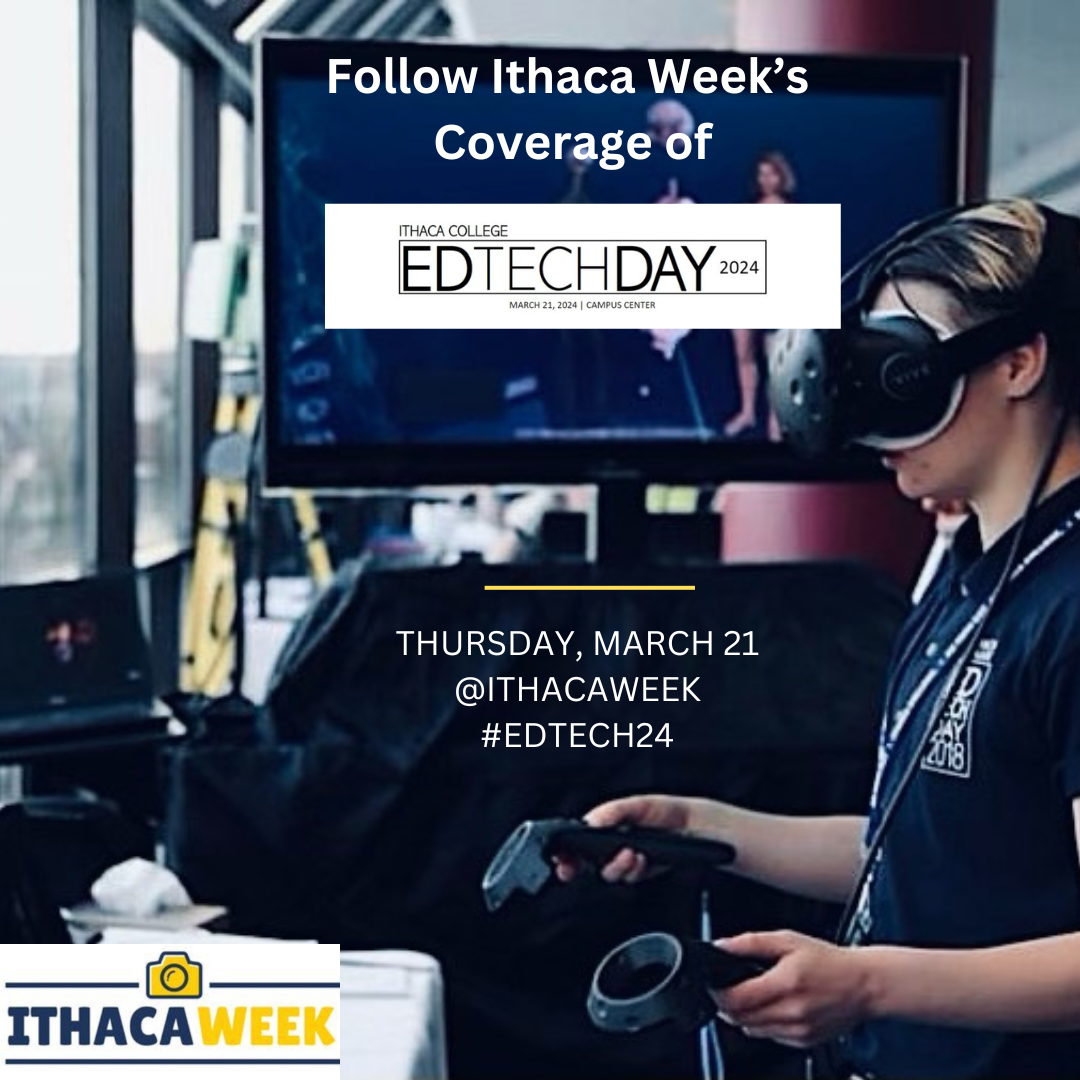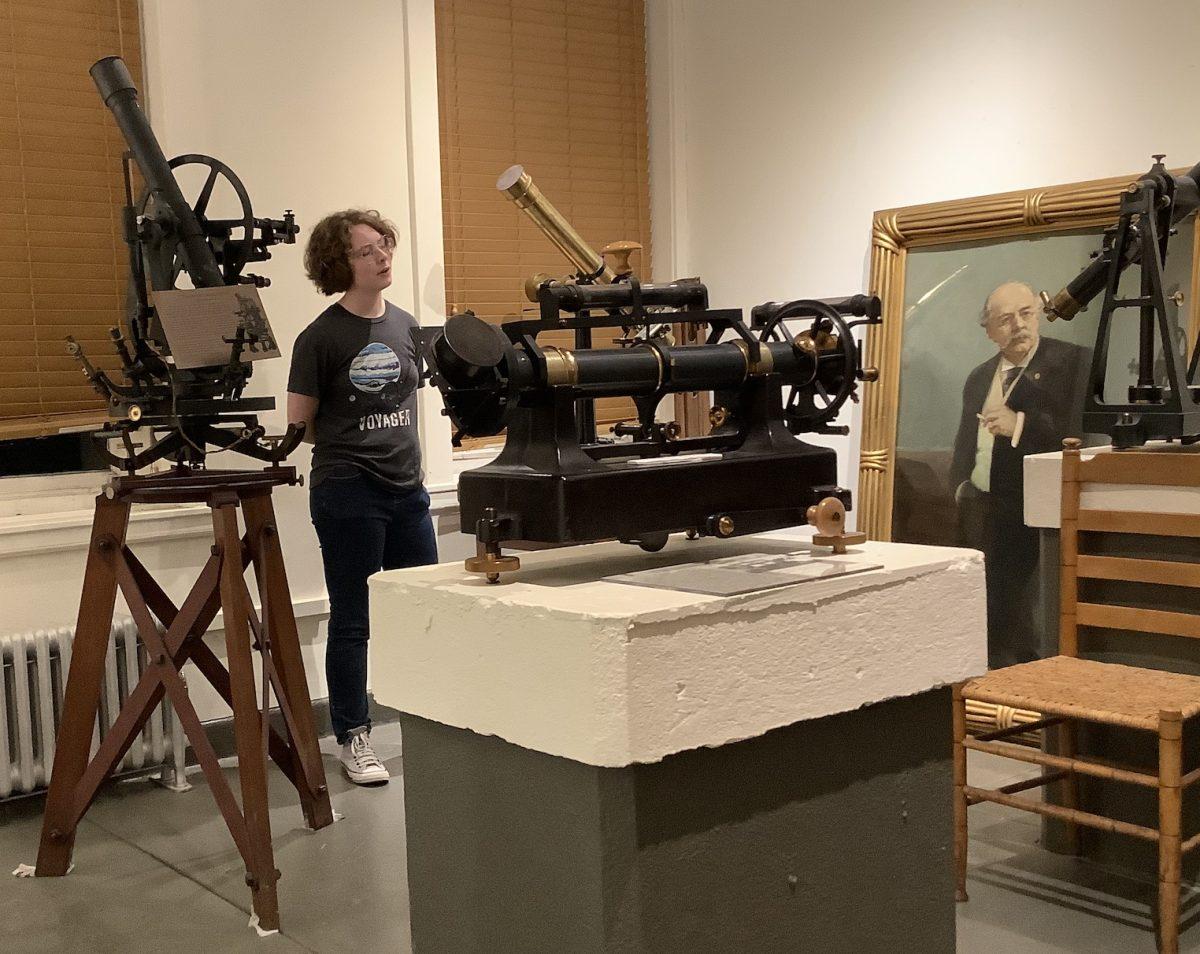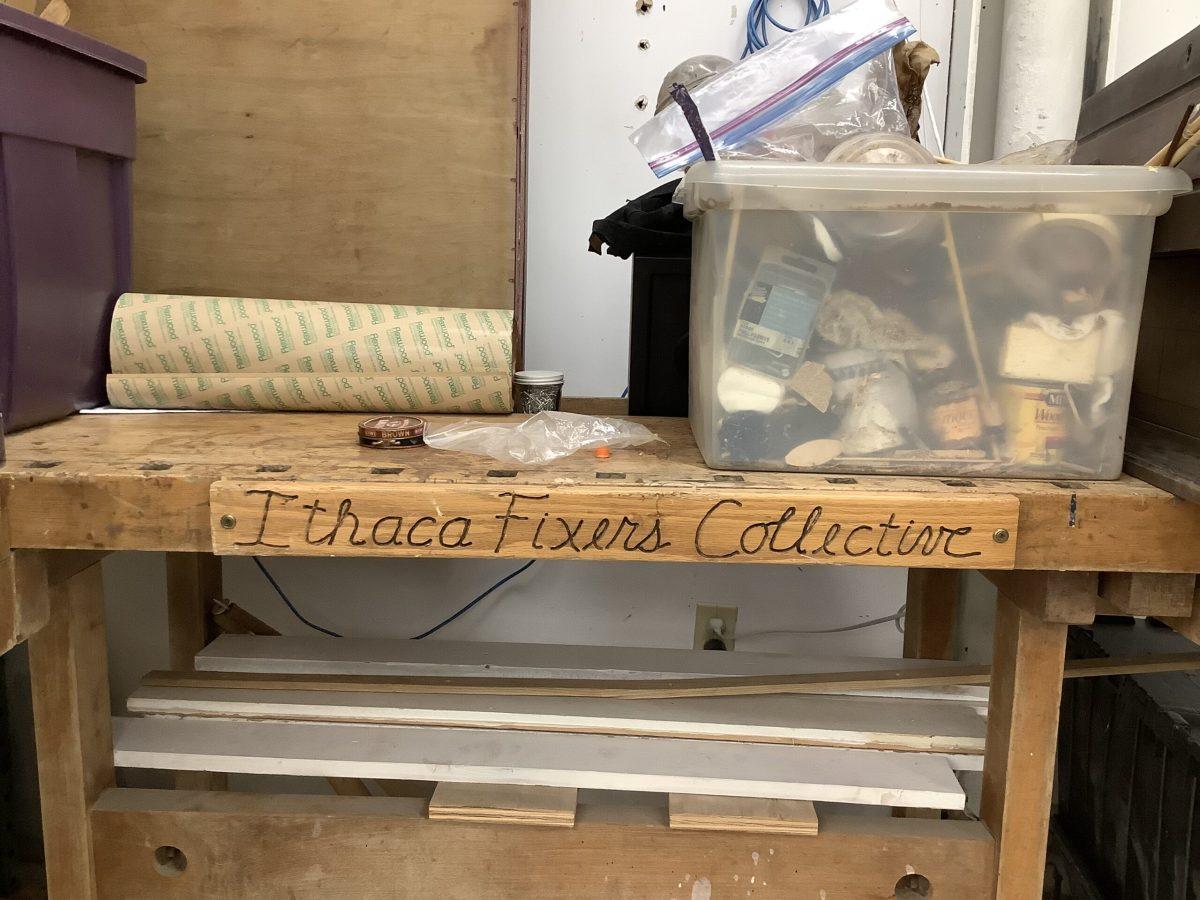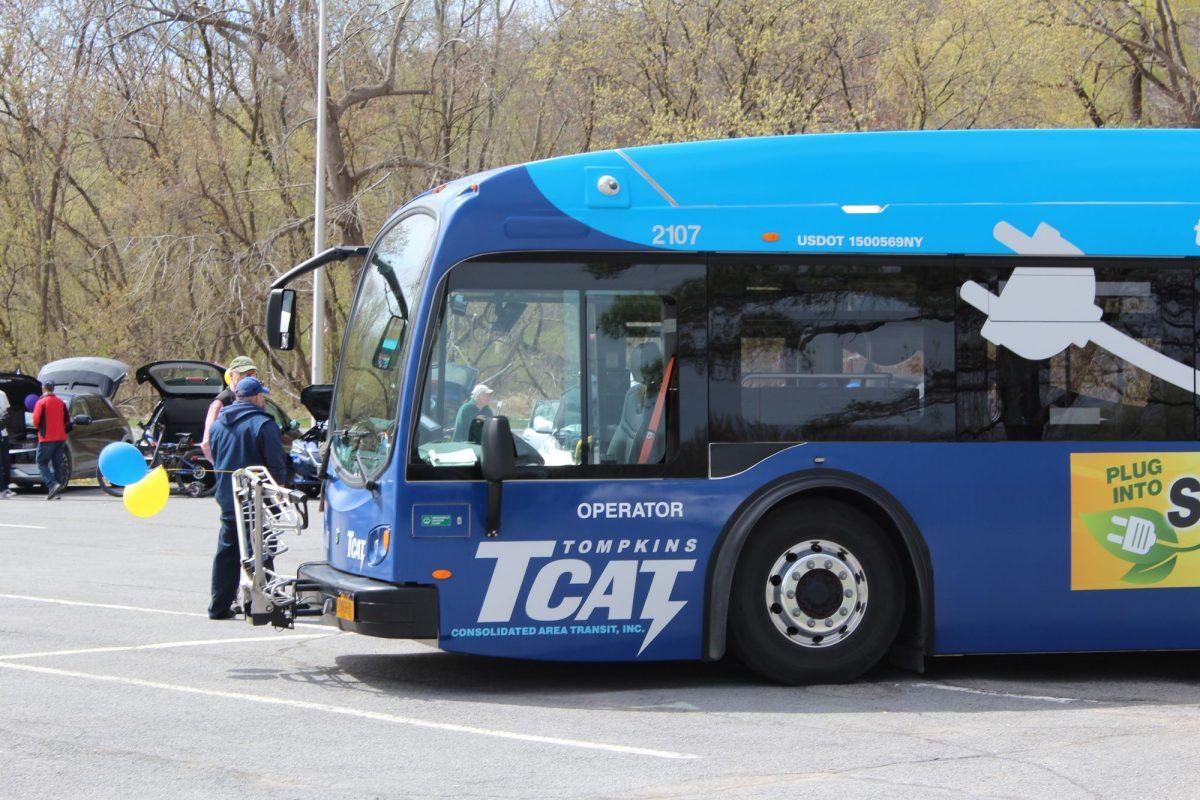
Live coverage of Ed Tech Day at Ithaca College is powered by Ithaca Week’s team of reporters. On March 21, this live blog will be updated with multimedia stories.
You can also follow our coverage on Facebook, Twitter, and Instagram.
Technology Is Not Everything

3:50 p.m. – “Technology is not the end-all be-all solution,” said Kelsey Greene, manager of Professional Development and Promotions for Project Look Sharp here at Ithaca College.
Project Look Sharp is a media literacy program of IC that provides professional development and lesson plans for the effective integration of media literacy into classroom curricula, at all levels of education.
Greene is an IC alum and has been working with Project Look Sharp for six years now. She led her seminar “Tech does not solve it all! Teaching Soft- Skills in Our Digital Democracy” today as part of IC’s Ed Tech Day 2019.
The seminar began with the statistic that “45% of teens say they are online almost constantly.” In other words, almost half of the teenagers in the United States are online 24/7. While this may or may not come as a surprise, it is impacting everything.
Greene presented multiple studies that have been done in which different groups of individuals of different ages and backgrounds were asked to distinguish between fact and opinion. The results show that there is little difference in the ability to assess political misinformation between groups of students with high levels of political knowledge, and groups with low levels of political knowledge.
Confirmation bias plays a large role in this and is found to be the greatest among individuals with the most political knowledge. Greene believes therefore, teaching political knowledge in school is simply not enough.
– Story by Sarah Resman
Using Technology to Make International Learning More Accessible

2:45 p.m. – Two professors from The College of Brockport offered a novel approach to making international learning more accessible — Collaborative Online International Learning, or COIL, courses.
The idea of COIL classes isn’t necessarily new — other colleges may call them “virtual exchange” courses — but the COIL program specifically started within the State University of New York system.
According to Ann Giralico Pearlman, senior instructional designer and international curriculum coordinator at The College of Brockport, approximately only one percent of students have the ability to study abroad during their college career. But technology has progressed to such a point that universities can now offer students cross-cultural experiences online.
Professors like Jie Zheng, associate professor in the Department of Education and Human Development at the College of Brockport, work with faculty from all over the globe to collaborate on a curriculum for COIL classes, often working across disciplines. COIL courses at Brockport are currently offered in kinesiology, communications, women and gender studies, and more.
The ways that students interact with their international colleagues varies by course, and is usually determined by the technology available and the time difference. Zheng described some of the challenges of teaching a COIL course with a colleague in China, where Facebook is banned and there’s a 12-hour time difference. But more often than not, Brockport students will Skype, FaceTime, or WhatsApp with students at universities in Sweden, Russia, Brazil, Canada, or elsewhere to collaborate on projects — and to gain a global perspective.
– Story by Meaghan McElroy
Lansing Robotics Focused on Building Team’s Future

2 p.m. – Using nothing but video game controllers and a cellphone, three Lansing Robotics engineers steer their robot to pick up balls and blocks, and place them in a basket. The award winning team is also looking to pick up something even more important for its high school robotics club: funding.
“We’re here today to just kind of show off our robot and kind of demonstrate what our club can do,” said senior Zachary Kobylarz. “Mostly, also to get sponsors because our budget has been reduced because our school does not fund us. We have to do our own outreach, and this is a really good means of getting different companies interested in our robot. This is my last year personally. We have to work on getting the funding up for future years.”
Kobylarz says that their robot, which took around a semester to create, coupled with heaps of trial and error, is the fulfillment of FTC team requirements. “Basically, they assign all the construction and course selection and we have to design a robot to fulfill these tasks and score as many points as possible,” said Kobylarz.
The team’s priority when creating its robot? Efficiency. “We use a hammer like design where we have an intake on one side and deposit minerals on the other. We felt that was really efficient because all you have to do is pivot an arm, roughly 180 degrees.”
And efficient they are. The team is regional winners in New York state for its achievement. Check out the team’s incredible work in Emerson Suites at Ithaca College today!
–Story by Morgan Kornfeind
Immersive Court Offers a Hands-on Experience

2 p.m. – Want to see what Jane Goodall’s camp looked like when she studied apes? Or maybe journey through the human body, all from your seat?
The Immersive Court at Ed Tech day allowed visitors to try out a variety of different virtual reality programs and technologies, such as the Oculus Go, Google Daydream, and HTC Hive. Some programs offered on different VR devices allow students to practice lab skills before they even step in the classroom; others allow the user to step into the shoes of an incarcerated person, to see what being in prison is really like.
Lauren Suna, a student technology specialist with Ithaca College’s IT department and a junior at Ithaca College, said that VR can be used in the classroom to allow students to have experiences they wouldn’t have been able to be a part of otherwise.
Suna said that her favorite part of VR technology, other than the educational possibilities, is the storytelling aspect — as a lifelong fan of video games, she’s always been drawn to the stories of games, and now, she can be immersed in a video game’s world.
“As a kid, all I wanted to do when I played games was to jump inside my TV,” Suna said. “Now, that little kid dream becomes a reality.”
– Story by Meaghan McElroy
The Integration of Virtual Reality into Education

A Virtual Reality Simulation showcases how education and VR are being combined. (Photo by Mila Phelps-Friedl / Ithaca Week)
1:45 p.m. – Video-gaming isn’t the only field that can benefit from the use of immersive technology like virtual reality.
Imagine a world in which VR is utilized to bring learning experiences to students, replacing the world around them with simulations in which they are able to interact and control aspects of their surroundings. At this year’s Ed Tech Day, participants learned about the way immersive technology can be, and is being, fluidly integrated into education.
The seminar was lead by Becky Lane, an affiliate faculty member at Ithaca College. Lane specializes in the integration of technology into teaching and education, and is working with the college on getting immersive technology into classrooms.
According to Lane, virtual reality can be integral when it comes to kinds of training or teaching that could be impossible, inconvenient or difficult to actually do — underwater ocean-studies with a full-sized whale for instance. It can also be helpful when it comes to performing expensive or difficult science experiments, generating projected data before going through with the actual procedure.
Lane create IC Immersive at Ithaca College, an organization that fosters a community with an interest in virtual reality. IC Immersive also consults with faculty on ways to involve immersive tech in classroom settings, exploring the many ways it can influence numerous academic fields, including but not limited to; physical/occupational therapy, architecture, graphic design and biology.
Check out IC Immersive near the IT Center at Ithaca College to experience VR for yourself!
– Story by Mila Phelps-Friedl
The Future of 3D Printing

1 p.m. – Ihab Mardini, assistant professor at Rochester Institute of Technology, gave a presentation into the world of 3D print making.
There are two different ways 3D printing happens. First, there is FDM Printing, known as Fused Deposition Modeling, which is the most popular 3D printing technology. Here, an object is built by selectively depositing melted material in a pre-determined path layer-by-layer and prints at 100-70 Microns.
There is also SLA printing, known as Stereolithography. Stereolithography converts liquid material into solid parts, layer-by-layer and prints at 50-25 Microns. A micron is equal to one millionth of a meter. It refers to the layer height or the print resolution of what you’re trying to print.
One popular SLA material that Mardini uses is elastic. The printing details depended on the resin itself. Resin is the liquid material used in the 3D printers, similar to using ink in a regular printer. The physics of light makes the resin travel through optics and into the resin tank. This is where the resin is stored while the printer is being used.
– Story by Samantha Cavalli
A Random Walk Down Wall Street at Ed Tech Day 2019
12 p.m. – The 29th annual Ed Tech Day at Ithaca College features 60 vendors in and around the college’s Campus Center. Standing out among the throng of people inside Emerson Suites were two gentleman representing the technological interests of Wall Street.
David Snyder, general manager of Pass Perfect, and Jim Mahoney, a consultant for University Finance Lab, teamed up to introduce technology aimed at preparing students for a future in finance, business, analytics and similar industries.
Pass Perfect is a company offering Securities’ Industry Essentials (SIE) exam prep to college students interested in interning or applying for positions with banks and funds such as Merrill Lynch, Edward Jones and Goldman Sachs.
So rather than wait to take the exam while at one of those companies, and at a higher cost to both the company and student, Pass Perfect offers students both the affordability and accessibility of online material that not only introduces them to the industry, but also sets them apart from their peers, too.
Mahoney and University Finance Lab work with Snyder and Pass Perfect to offer students additional hands-on experiences during college, building trading rooms that feature live market tickers across the United States. The company is responsible for building the Bloomberg-associated trading room in IC’s Business School.
Mahoney said that his company is currently working to build an analytics lab in the business school, which he expects to be completed by next semester.
— Story by Jason Hannigan
Interactive Flat Panel Brings the Classroom Together

12 p.m. – The BenQ Corporation showed off a 75-inch interactive board called the Classroom Care Interactive Flat Panel that can be used in classrooms and other work spaces.
One major selling point of the board is that it has a germ-resistant screen. The screen is covered with a multilayer coating of a non-toxic, durable nano-ionic silver agent which can kill off most bacteria and viruses on contact by disrupting their cell division mechanism.
The screen also has a certified low blue light screen. Having this technology reduces any harm caused by blue spectrum light that can be found in our cell phones. The screen is also equipped with a PIR (passive infrared) Motion Sensor that can detect people coming close to the screen and turn on the Low Blue Light function automatically.
In a classroom setting, a teacher can open up a document and students can take a picture of a QR code on their phones. This will direct the students to see the screen and what the teacher is writing on the board. The teacher can also make the students editors and they can write on their phones for everyone to see as well.
–Story by Samantha Cavalli
Technology Helps Assess Ithaca College’s Carbon Footprint

10 a.m. – Two large screens illuminate the hall behind the sign for the Office of Energy Management & Sustainability. One of the screens has a bar graph with an upward trend. Senior Ithaca College student, Hailey Nase, an intern for the office, pointed to the graph and explained that it shows how much energy is currently being produced from the 2.9-megawatt solar farm in Geneva, NY. The solar farm produces energy for Ithaca College. Beginning in 2016, the solar farm started producing 10% of the college’s energy needs.
The other screen has a large chart of the college’s carbon footprint. It shows a downward trend, indicating that the college is leaving less of a footprint every year.
Each year, the Office of Energy and Sustainability conducts research and collects data on how much clean energy the college is using and how much of a carbon footprint the college is making.
Nase explains that the purpose is so “we know for the future whether we are doing better or worse and where we can improve.”
Already an improvement from previous years, the energy of Ithaca College is 100% renewable. The goal of Nase and the Office of Energy Management and Sustainability is for Ithaca College to be carbon neutral by 2050 or sooner.
–Story by Gianna Folz
3D Game Market Allows Gamers to Play Games in 3D Without Glasses

9 a.m.– Ed Tech day kicked off with over 60 vendors showing off innovative and groundbreaking technology. 3D Game Market made an appearance with its Vice President of Business Development, Vincent Lindow Jr., who instructed passersby on the technology that he and others developed. The technology allows people to experience 3D gaming without any glasses.
Lindow explained that he and others take regular video games in 2D and turn them into 3D. “We create something called a depth map,” he said, pointing to the video game playing on the computer screen. He pressed a button and the video game switched into black and white.
“Any object that is really close is depicted in white and any object that is really far away is depicted in black and then there are 250 shades of gray in between,” said Lindow. “Because of these different shades, the computer can identify the shades, and then it knows how far back the objects are, it can do the math.”
This math helps the software split the pixels into the correct amount of distance so the viewer can see the image in 3D.
–Story by Gianna Folz
Ed Tech Day Highlights Innovation
 The 29th annual Educational Technology Day will take place at Ithaca College on Thursday, March 21, from 9 a.m. – 3 p.m. Ed Tech Day, held in the Campus Center, is an opportunity for participants to engage in information sessions, showcases, and a number of other events centered around technology development.
The 29th annual Educational Technology Day will take place at Ithaca College on Thursday, March 21, from 9 a.m. – 3 p.m. Ed Tech Day, held in the Campus Center, is an opportunity for participants to engage in information sessions, showcases, and a number of other events centered around technology development.
In addition, a 50-foot mobile video gaming theatre called ‘Gamin’ Ride’ will be displayed on the academic quad outside Campus Center. This is one of the four new immersive experiences that Ed Tech Day has added to its itinerary this year.
For students who may be interested in pursuing a career in technology, Ed Tech Day has also partnered with Career Services in order to provide a Career & Internship Expo in the Campus Center lobby. Students will have an opportunity to speak with tech industry experts and leaders in order to explore career and internship opportunities.
This event has made a name for itself not only in Ithaca, but also on a national scale. Ithaca was named one of the most innovative US cities for technology, in a November 2018 USA Today article, which mentioned Ed Tech Day as one of the key reasons why.
–Story by Emily Cartwright

